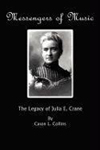 Messengers of Music: The Legacy of Julia E. Crane, by Caron L. Collins. Information Age Publishing. Inc., 2011. ISBN 978-1-61735-563-9.
Messengers of Music: The Legacy of Julia E. Crane, by Caron L. Collins. Information Age Publishing. Inc., 2011. ISBN 978-1-61735-563-9.
"Both musician and teacher must be combined in the successful teacher of music.” So wrote Julia Etta Crane (1855-1923), the founder of The Crane School of Music, over 125 years ago. This erudite and visionary musician and educator also said that the best music teacher “sees the development of the character of the pupils as his first concern.” In this 125th anniversary year of The Crane School of Music at SUNY Potsdam, interest in the life and mission of this innovator in music education is particularly highlighted. Caron Collins, Assistant Professor at The Crane School of Music, has written a beneficial book, giving us an overview of Julia Crane’s life and times, along with a multitude of interviews of graduates of Crane who discuss and elucidate how they apply the lessons of Julia Crane and The Crane School of Music in their lives as teachers of music.
Julia Crane had an interesting background in her musical training. In addition to voice, she studied piano from the age of 11 and was quite proficient by age 14. She graduated from the Potsdam Normal School in 1874 and taught until she went to London where she studied with the famous voice teacher Manuel Garcia (the teacher of Jenny Lind), who may have inspired her innovative work with voices and singing. She also gave recitals in England to some acclaim, returning to New York in 1882 where she eventually was invited to be the music teacher at Potsdam’s Normal School (a normal school at the time taught the standards or norms of education, training students to become teachers).
At the Normal School, Crane gave one hour of instruction in music per week. This was a pivotal moment in that Julia Crane was able to demand from the director more time for the teaching of music and was granted permission to schedule more classes with these future teachers, gradually developing her complete system of music instruction from primary through Normal School.
Ultimately, she founded a music school in 1886, the Crane Institute of Music, in the North Country of New York state, which was one of the first institutions in the country to have programs dedicated to preparing specialists in teaching music in the public schools. This became The Crane School of Music, a part of SUNY Potsdam.
Julia Crane wrote one of the first methods on music education; this manual went through eight printings from 1887 through 1923 and had a great influence on music education in America. In her manual, she formulated clear directions for lesson plans but stressed that the teacher must always remain flexible. Her plans, she said, “will give music its right place in the general scheme of education.” Julia Crane stressed having a happy class in her manuals. “A happy quality of tone can only come from a happy ear.” Her “Special Aims on Rote Singing” are a good example of her philosophy of music education:
- To familiarize pupils with standard and classic songs, and to awaken a love for music.
- To cultivate taste.
- To cultivate the voice.
- To teach a good style of singing.
- To train the ear.
- To promote natural breathing.
She became known for her revolutionary methods. As she said “It seems to me there is today…too much training and too little growth, too much…bending of twigs, and too little swaying and dancing in the breezes, too much molding, decorating, dwarfing and too little spontaneous expression.”
Throughout the book graduates of Crane are interviewed, and Julia Crane’s heritage of innovative student-centered teaching is investigated and reviewed. One example is Carol “Kickie” Britt, a Crane alumnus and director of the Crane Institute of Music Business who initiated the annual and highly influential Music Business roundtable. Or, as alumnus Jane Morale said: “The Crane School prepared me for my teaching career” and ”encouraged me to take risks.”
After her untimely death in 1923, her influence in music education gradually extended across the country spreading “the message that music brings.” Messengers of Music: The Legacy of Julia E. Crane brings to life a singular era not only in the history of music education, but also in the history of a woman’s vision and how that vision is kept alive in the school which bears her name and so many others across the United States. Julia Crane’s words resonate even today, and it is valuable to revisit her philosophy and hear a voice that speaks so eloquently of the values and importance of music to the individual and society.


